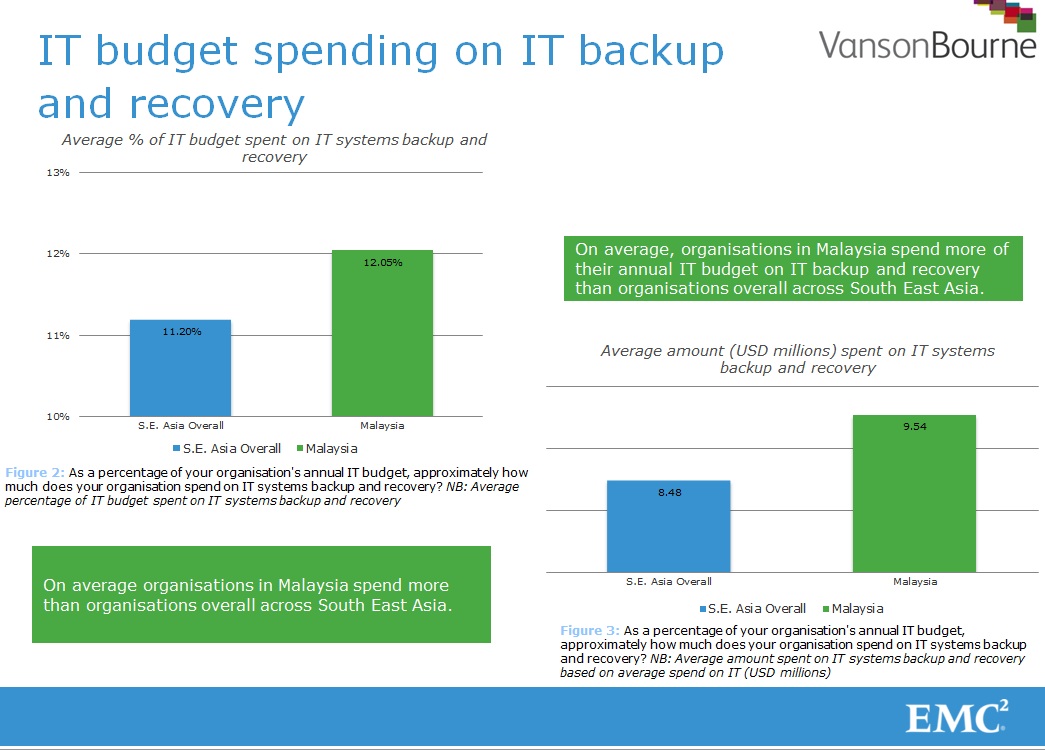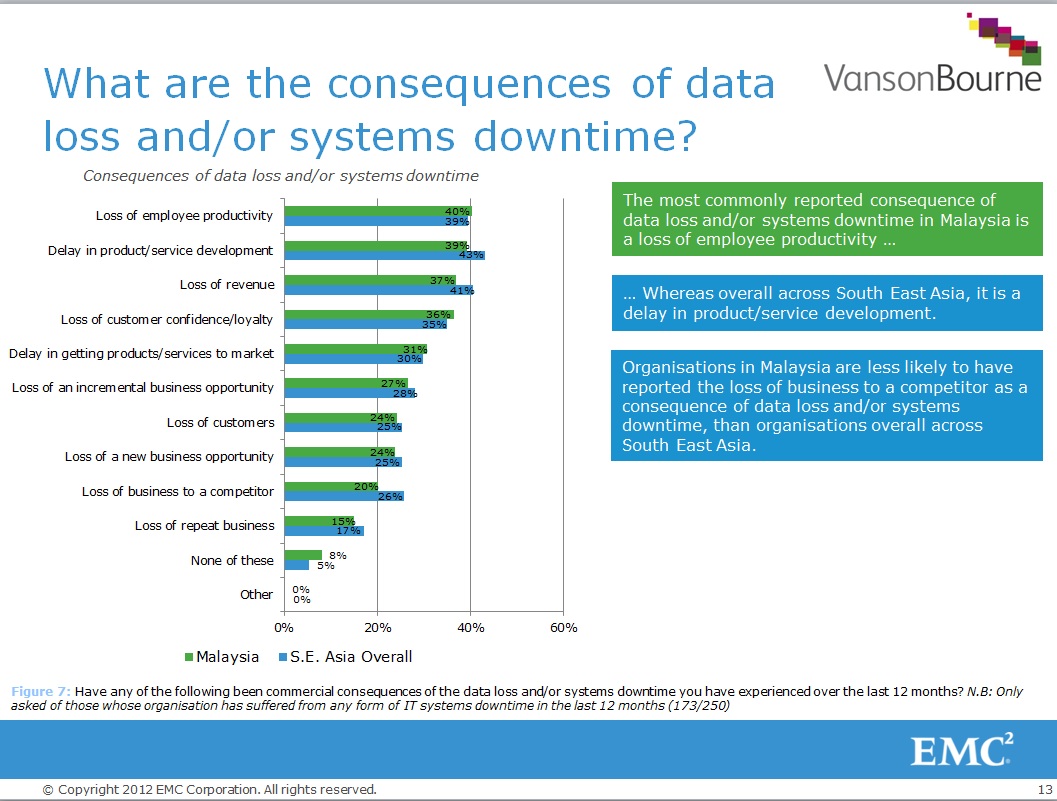Disaster: Malaysian companies not confident they can recover
By A. Asohan June 22, 2012
- 87% of organizations in Malaysia are not very confident that they can fully recover after a disaster
- 43% of Malaysian organizations who store a backup copy offsite for disaster recovery still use tape for recovery
ORGANIZATIONS in Malaysia spend more of their IT budget on backup and recovery than their regional counterparts, but are seemingly less confident of their investment in such risk management.
According to the results of The Disaster Recovery Survey 2012: Asia Pacific and Japan commissioned by storage specialist EMC Corp, 87% of companies in Malaysia are not very confident they can fully recover systems or data in the event of a disaster.
This is despite the fact that organizations in Malaysia spend a bit more of their IT budget on disaster recovery (about 12%) than other companies in South-East Asia (11.2%).
 Organizations in Malaysia (47%) were more likely to be spending at least 10% of their IT budget on IT systems backup and recovery than organizations across South-East Asia (39%).
Organizations in Malaysia (47%) were more likely to be spending at least 10% of their IT budget on IT systems backup and recovery than organizations across South-East Asia (39%).
In trying to explain the dichotomy of spending (click to enlarge chart) more yet being less confident of their backup and recovery, EMC Computer Systems (Malaysia) managing director Cheam Tat Inn said that this was indicative of Malaysian companies depending on outdated technology such as tape backup.
“Enterprise risk management is also a management discipline – you have to keep testing your backup systems and business continuity plans to ensure you can respond to any disaster.
“We’re a country that is relatively safe from natural disasters and security threats such as terrorism. Perhaps this has led to some amount of complacency,” Cheam told a media briefing on June 21.
Despite their lack of confidence, 69% of Malaysian organizations lost data or suffered systems downtime in the last 12 months, compared with the regional average of 74%.
The survey was conducted by Vanson Bourne, a specialist research-led consultancy, which interviewed 2,500 IT decision-makers in private and public sector organizations in Australia, China, India, Japan, Korea, Indonesia, Malaysia, the Philippines, Singapore and Thailand.
Each organization ranged between 250 and 3000-plus employees and represented a variety of industries including manufacturing, retail, financial services and telecoms, among others.
 Shane Moore (pic), EMC director of product marketing, Backup & Recovery Systems Division, Asia Pacific and Japan, called it the biggest survey of its kind in the region.
Shane Moore (pic), EMC director of product marketing, Backup & Recovery Systems Division, Asia Pacific and Japan, called it the biggest survey of its kind in the region.
“From each country, including Malaysia, we polled 250 such decision makers,” he said. “There were four areas that we wanted to analyze: Spending on IT backup and recovery; data loss and system downtime experiences; disaster and recovery plans; and the media and methods used for backup and recovery.”
The survey also found that downtime and data loss were more likely to be caused by an IT problem than a natural disaster.
The three most common causes of data loss and downtime in Malaysia were hardware failure (51%); data corruption (51%) and loss of power (50%).
In fact, Malaysian companies were more prone to suffering loss of power than their regional counterparts (44%).
“Loss of power is one of the major causes of downtime – it is in the top three across all countries in the region,” said Moore.
Only 13% of Malaysian respondents cited natural disasters as a cause of systems downtime or data loss, and 16% to employee sabotage. Regardless of the cause, 61% of Malaysian organizations reviewed and changed their procedures for backup and recovery in response to an incident.
Furthermore, 51% of businesses increased their spending on backup and recovery after a disaster. This is against a backdrop where 36% of organizations surveyed did not feel they were spending enough on backup and recovery.
The study identified that there are measureable business impacts from systems downtime, with the top three (click to enlarge chart) cited by Malaysian organizations being loss of employee productivity (40%); loss of revenue (37%) and delay in product/service development (39%).
Systems failure resulted on average in two lost working days for the Malaysian businesses in the survey. Based on an average eight-hour working day, this is the equivalent of 32,000 man-hours for a Malaysian company employing approximately 2,000 employees, EMC noted.
Additionally, each organization lost an average of 1099GB of data during a 12-month period. Given that 1MB of data is approximately the equivalent of 25 email documents in size, losing 1099GB of data would be the equivalent of losing 27.48.1 million emails, the company said.
Despite loss of revenue being rated as a major consequence of systems downtime, the research also revealed that many Malaysian companies are not doing enough to protect essential customer data.
64% of organizations do not have a disaster recovery plan for their CRM (customer relationship management) systems, while only 5% of organizations who do have a disaster recovery plan for their applications would require their CRM applications to be up and running first following systems downtime.
Furthermore, businesses in Malaysia are failing to take advantage of insurance premium benefits that a comprehensive disaster recovery plan can engender. 62% of companies in Malaysia are obliged by either insurance policies or regulatory requirements to have a disaster recovery plan in place.
More importantly, however, 40% of Malaysian organizations surveyed are offered reduced premiums by their insurance provider according to the strength of their IT systems backup/disaster recovery strategy.
“But 36% of Malaysian organizations do not know if their insurance provider offers such reduced premiums – or they had never considered it at all – highlighting a missed opportunity for many businesses,” said Cheam.
Outdated solutions
For backup and disaster recovery purposes, 43% of Malaysian organizations still rely on tape. Looking at the operational cost associated with tape, organizations in the Asia Pacific and Japan region spend on average more than US$58,821 (RM185,484) including transportation, storage, test and replacement of tape for the purposes of offsite disaster recovery.
Meanwhile, 35% of companies rely on outdated CD-ROM for backup storage. Surprisingly, 14% of Malaysian organizations have an employee take a copy of their backup home with them for safekeeping, just below the regional average of 14%.
“In India, 42% of companies allow employees to take backup copies home,” said Moore.
However, 61% of businesses in Malaysia are already using modern disk-based backup and recovery solutions. This trend looks set to increase, with 80% of tape-using organizations looking to move beyond tape, EMC said.
The top three reasons cited for this planned move are faster backups (40%); speed of data recovery and system restores (38%); durability (disk-based methods have a longer lifespan; 31%); and total cost of ownership (31%).
Related Story:



